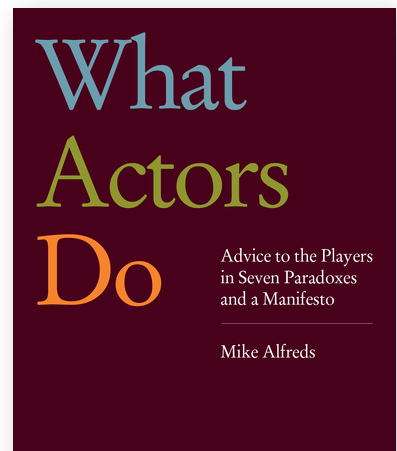
‘What Actors Do’
Advice to the Players in Seven Paradoxes and a Manifesto
by Mike Alfreds
Nick Hern Books 2023
Reviewed by Andrew Hilton
Mike Alfreds, now in his ninetieth year, is one of our most esteemed and widely experienced theatre directors. Among his many other credits, he has directed for the National Theatre, the Royal Shakespeare Company and Shakespeare’s Globe; he has run the Cambridge Theatre Company and founded Shared Experience. Abroad, he has worked in the US, in Canada, Israel, Australia, New Zealand, Germany, Norway, China and Mongolia. Though he worked for some time in Hollywood for MGM, he has been essentially a theatre director and remains a passionate advocate for theatre and for the art of the actor.
As the subtitle suggests, this book is intended for the actor. It honours the actor’s art – the single element that is non-negotiable in the experience which is theatre – while demanding much more than the average modern actor is prepared to commit, or has been trained to look for.
Alfreds is a Stanislavskian in his insistence that playing an objective is both essential and liberating. It will connect the actor with his/her subconcious, permitting areas of empathy with the character that the conscious mind cannot access. Emotion will flow from it – the actor should never strive for emotion, attempt to identify and apply it from some perceived library of feelings. The objective is the key, the only route to true creativity.
The book is endlessly quotable; one of the many lines that I marked was this: we all have the same potential to experience anything that is human. He then goes on to remark how alarming is the growing call for ‘authenticity’ in casting. To play a father, you have to be a father, to play a gay you have to be gay – and so, by implication, to play Macbeth you have to be a murderer … etc etc. An issue highlighted recently by the furore over Michelle Terry’s casting as Richard of Gloucester at the Globe.
I was particularly struck by his account of his training in direction at the Carnegie Institute of Technology (now Carnegie Mellon University in Pittsburgh) in the late 1950s. This was exhaustive, requiring him to experience, and practice, every single theatre art over the course of three years. I know of no remotely comparable course offered here.
For non-actors, this book offers a window on the actor’s art; for the actor both an interrogation and a call-to-arms from a director whose passion for the theatre has clearly never dimmed.
Andrew Hilton, formerly the Founder & Artistic Director of Shakespeare at the Tobacco Factory, is the author of ‘Shakespeare on the Factory Floor’

